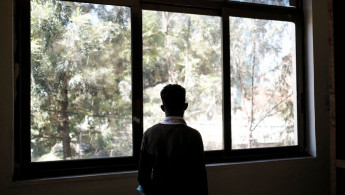Ethiopian court extends 3-month detention without charges of AP journalist
An Ethiopian court has extended the three-month detention without charges of journalist Amir Aman Kiyaro to give police 11 more days to interview witnesses, saying after that the state must formally charge him or release him.
Kiyaro, a freelance journalist accredited to The Associated Press, has been in detention since November. The next court date for Kiyaro's case was set for March 29.
“The Associated Press is dismayed by the court’s decision today to continue to detain Amir Aman Kiyaro. He continues to be held without charges," AP Executive Editor Julie Pace said.
“We urge the Ethiopian government to release Amir immediately and end his unjust detention,” Pace said. "As we have said, it is clear he is being targeted for his independent journalism.”
An Ethiopian court has extended the three-month detention without charges of journalist Amir Aman Kiyaro to give police 11 more days to interview witnesses. The @AP has renewed calls for Ethiopian authorities to immediately free Kiyaro. #FreeAmirAmanKiyaro https://t.co/we02VzvhLV
— The Associated Press (@AP) March 18, 2022
The video journalist was detained on November 28 in Ethiopia’s capital, Addis Ababa, under the country’s war-related state of emergency powers.
The state of emergency was lifted in February as the government cited changing conditions in the deadly conflict between Ethiopian forces and those of the northern Tigray region.
State media, citing federal police, said he is accused of “serving the purposes” of what they called a terrorist group by interviewing its officials. Local journalist Thomas Engida was arrested at the same time and is facing similar charges.
Officials with the Ethiopian Media Authority, the prime minister’s office, the foreign ministry and other government offices have not responded to repeated requests from the AP for information about Kiyaro.
Federal police inspector Tesfaye Olani told state media that the journalists violated the state of emergency law and Ethiopia’s anti-terrorism law, and the violations could lead to sentences of seven to 15 years behind bars.
After three months of arbitrary detention, “it cannot be any clearer that authorities have no case against Amir Amar Kiyaro,” Muthoki Mumo, sub-Saharan Africa representative with the Committee to Protect Journalists, said earlier this month.
Kiyaro’s supporters have launched a social media campaign calling for his release: #FreeAmirAmanKiyaro.
Prime Minister Abiy Ahmed took office in 2018 with sweeping political reforms that in part led to him being awarded the Nobel Peace Prize the following year. Several journalists were released from incarceration and for a brief period, no journalist in Ethiopia was in prison. But media advocacy groups that once praised those reforms have since criticized the dramatic backsliding that followed, notably since Ethiopia’s war began in November 2020.
Earlier this month, more than a dozen Ethiopian journalists in an open letter condemned the persecution of journalists including Kiyaro, saying that “the hostile environment so many of our colleagues in Ethiopia currently find themselves in has them intimidated, languishing behind bars, living in fear of the very real risk of arrest, and contemplating either quitting their jobs or fleeing the country.”





 Follow the Middle East's top stories in English at The New Arab on Google News
Follow the Middle East's top stories in English at The New Arab on Google News


